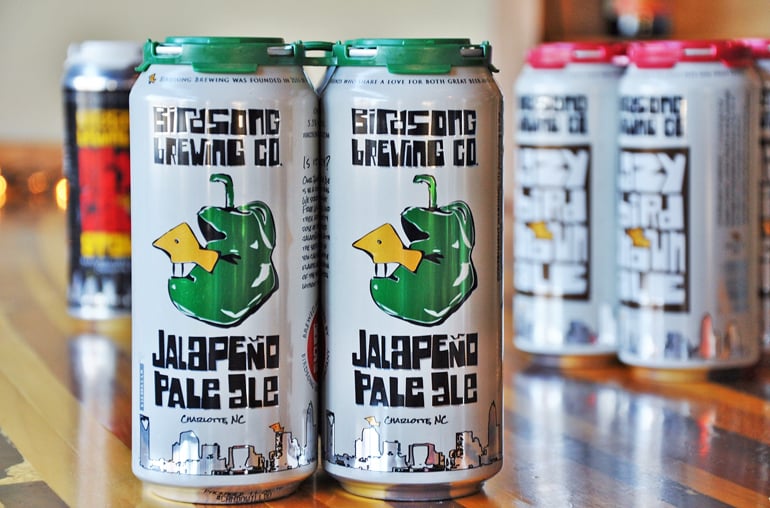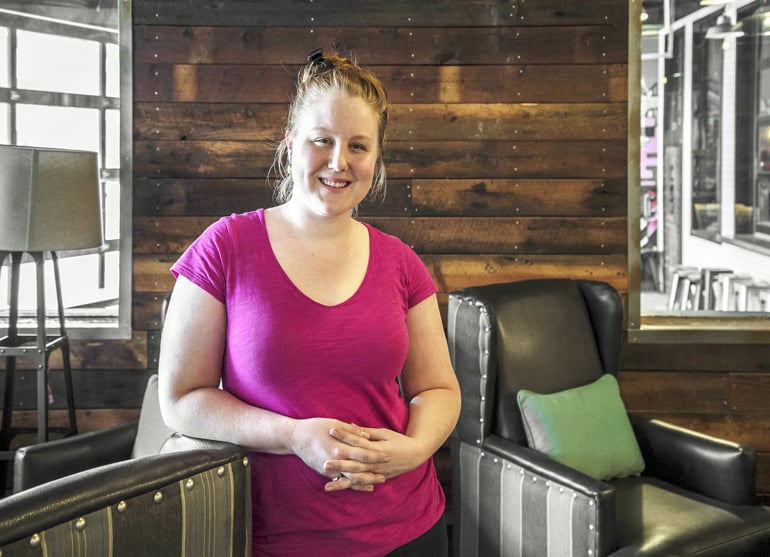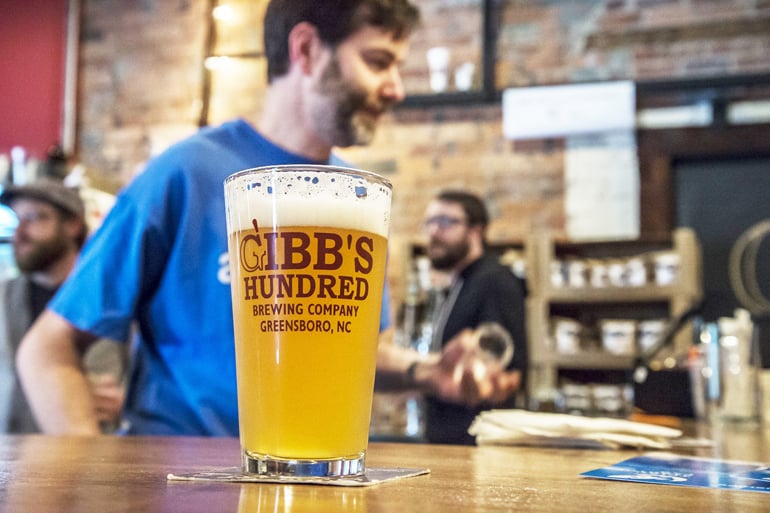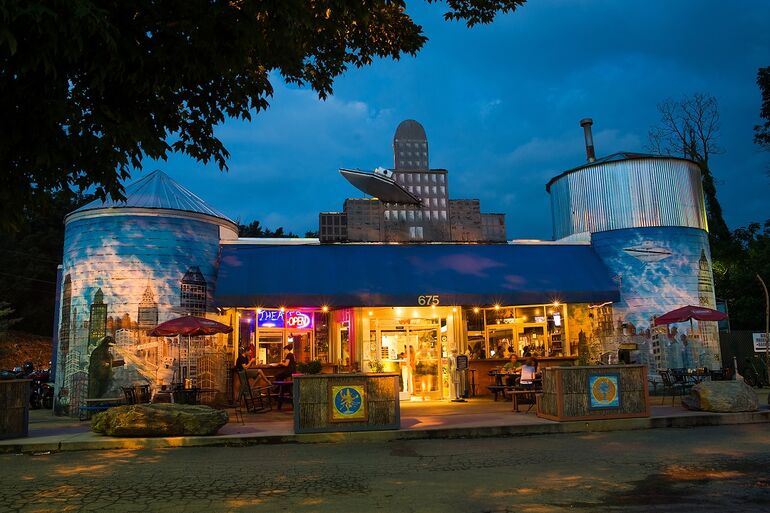Start 14-Day Trial Subscription
*No credit card required

Settling Ashe: Small Brewing in North Carolina (Issue 31)
North Carolina’s small breweries continue to have a positive effect on the communities they belong to. The recent acquisition of one of its own only underscores their success.
Mike Rangel of Asheville Brewing Co. sees progress all around him in the South Slope neighborhood of Asheville.
“It seems like every time another three breweries open a new hotel goes up or a new parking garage goes into the plan,” says Rangel, who opened Asheville Brewing in 1995. “The city is moving hard to keep up the infrastructure.”
The tourism trade is driving that growth.
“You can park in one place and hit eight or nine breweries, and that kind of thing continues to be main draw here,” says Rangel. “There’s no way you’re going to hit every brewery when you visit Asheville, so you leave with the feeling of needing to come back. And most people do.”
Asheville brewers aren’t the only ones drawing tourist traffic.
“People who come into town for something else always have time to visit a local taproom and try a local beer,” says Chris Goulet, president of Birdsong Brewing Co. in Charlotte. “We get a lot of folks from outside the city, especially on weekends.”

Asheville brewers aren’t the only ones drawing tourist traffic. “People who come into town for something else always have time to visit a local taproom and try a local beer,” says Chris Goulet, president of Birdsong Brewing Co. in Charlotte.
Nicole Preyer of Preyer Brewing Co. in Greensboro says the Greensboro Sports Commission has done a great job branding the city, “Tournament Town,” drawing everything from Olympic swimming trials to NCAA basketball tournaments to state high school soccer championships to local arenas and stadiums.
“We get a lot of calls from the visitors bureau and event planners,” she says. “Having a group of breweries is something fun for people who are here for tournaments to go do.”
Preyer says the growing number of small breweries in Greensboro has also helped the local chamber of commerce draw new employers.
“When a company is looking at relocating their headquarters, they always look at the area to see if there is enough there for them to retain talent,” says Mark Gibb, who, with his wife, Sasha, owns and operates Gibbs Hundred Brewing Co. in downtown Greensboro. “Breweries are generally well-received by everyone.”
Goulet gauges the economic impact of small breweries on Charlotte from the informal meetings he and about 20 other small brewery owners there have every month.
“Altogether, we’re approaching 1,000 employees and basically none of those jobs existed six years ago,” says Goulet. “We’ve also created distributor jobs.”
Preyer says local farmers are also benefitting from the success of small brewers in North Carolina. Many of Preyer Brewing’s ingredients are locally sourced.
“We picked up 600 pounds of strawberries from Faucette Farms in Browns Summit for our strawberry wheat seasonal,” she says. “I buy the same strawberries to eat with my kids at home.”

“We picked up 600 pounds of strawberries from Faucette Farms in Browns Summit for our strawberry wheat seasonal,” says Nicole Preyer of Preyer Brewing Co. “I buy the same strawberries to eat with my kids at home.”
Goulet said small breweries also do a lot to foster the culture of the communities they’re in. Birdsong, for instance, supports a number of non-profit organizations in Charlotte. Local musicians perform in its taproom, where local art is on display on a rotating basis. Goulet says Birdsong doesn’t take a commission so every dollar goes directly to the artists.
“I don’t know if we’re driving culture, but I think we’re facilitating a lot of those small-scale grass roots connection points,” he says.
In Greensboro, small breweries have helped create a neighborhood culture where there was none before.
“Where we are in the south end of downtown, we have seen a lot of development since we opened up,” says Gibb, whose brewery launched in 2014. “I think we’ve had six or seven new breweries open up in last few years, and it’s really changing the whole character of the neighborhood.”
Gibb remembers when he and his wife took their current space just off South Elm Street. The neighborhood is one of the oldest parts of town and back then hadn’t been touched by revitalization. Because rent was relatively low, many storefronts were occupied by sketchy businesses such as antique stores that were more or less junk shops.
“I do think there are certain types of businesses that are signs of what’s coming in a neighborhood,” says Gibb. “Breweries are one of those catalysts.”
Don’t take his word for it. Take a look at South Elm Street now. The junk shops are gone, replaced by art galleries, high-end specialty retailers and restaurants. More renovations are currently under way.
In Asheville, small breweries have gone beyond bolstering neighborhood culture. Collectively, they’ve helped define the culture of whole city.
“I think there are other North Carolina towns that have incredible breweries, but here breweries dominate all social aspects of Ashevillians,” says Rangel. “It’s what they do at night and where they go.”
North Carolina’s beer culture took a big hit in May, when Anheuser-Busch InBev, the world’s largest brewer with macro-brands such as Budweiser and Corona, announced its acquisition of a bastion of the Asheville beer scene, Wicked Weed.
Founded in 2011, Wicked Weed quickly established itself as one of Asheville’s best breweries with its West Coast and Belgian ales. It also had a knack for savvy marketing, releasing special batches in limited editions to create buzz for its brand. By the time AB InBev came calling, Wicked Weed had a passionate following all across the state.
“A lot of those people feel pretty solidly betrayed,” concedes Goulet. “Business-wise it’s just generally bad news. Now InBev is equipped to use [Wicked Weed] to dilute the meaning of ‘craft’ further and compete on price with their beer.”
“I don’t know if we’re driving culture, but I think we’re facilitating a lot of those small-scale grass roots connection points,” says Chris Goulet, President of Birdsong Brewing Co.
Gibb says he’s spoken to other North Carolina brewers about it, and he says their feeling is, “good for them. They’re good business people who grew their brand and a big guy saw their potential to grow it further and bought them out.”
The animus over the deal, he adds, has more to do with Anheuser-Busch InBev.
“There have been multiple big companies that have bought craft breweries, but [Anheuser-Busch InBev] is a little different,” says Gibb. “They seem to use scorched earth competition tactics. They’ve put intense pressure on their distributors to sell only ABI craft brands and drop other craft brands.”
Anheuser-Busch InBev has also leveraged its considerable ad budget to run Super Bowl ads making fun of craft beer and the people who drink it. And then there was this video, a direct challenge to the Brewers Association’s creation of an independent craft brewer seal for bottle labels.
Rangel has mixed emotions about the acquisition. Wicked Weed’s facility is right around the corner from his brewery, and Rangel has worked with Wicked Weed co-owners Rick Guthy, Walt Dickinson and Luke Dickinson.
“You get to know these guys and know they’re quality guys,” says Rangel. “They’ve done things that have helped Asheville in countless ways. I think the hope is that they will be able to change the monster from the inside out.”
Besides, adds Rangel, “right now there are six new sour breweries in line to be the next Wicked Weed that no one has heard of yet.”
Hi-Wire Brewing Co. co-owner Chris Frosaker says he thinks the craft beer industry in North Carolina will head in one of two directions from here. For small breweries aiming to go toe-to-toe with InBev’s growing roster of craft beer labels in grocery stories and other retail channels, quality will begin to trump local as the main selling point for consumers.
“You go to a lot of beer markets right now, and it’s all local all the time,” he says. “That’s great, but eventually local and quality will be neck and neck. Just being a local beer won’t be enough anymore.”
Another direction the small brewery scene could go in is what Frosaker calls “hyper-localized.” He cites what is currently happening on the west side of Asheville, where Oyster House Brewing Company and Up Country Brewing are located.
“Their business model to this point is to serve their neighborhood, and they do a great job,” says Frosaker. “The beer is fantastic. They just want to make their neighborhood happy and be a pillar of the community.”
"One day," Frosaker adds, "the neighborhood bar will be replaced by the neighborhood brewery as the place to go grab a beer."
Regardless of how the industry evolves in North Carolina, small brewers will continue to be important. If nothing else, the Wicked Weed acquisition proves they’re doing plenty right.

(All Photos Courtesy of Respective Breweries)



